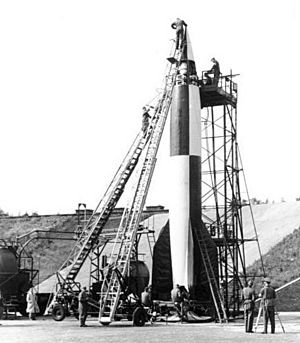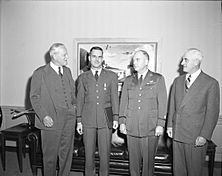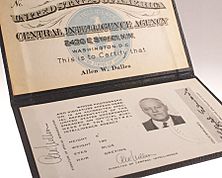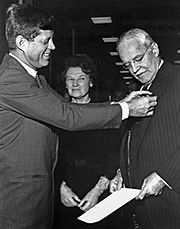Allen Dulles facts for kids
Quick facts for kids
Allen Dulles
|
|
|---|---|
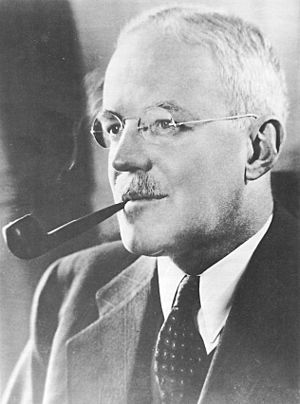 |
|
| 5th Director of Central Intelligence | |
| In office February 26, 1953 – November 29, 1961 |
|
| President | Dwight D. Eisenhower John F. Kennedy |
| Deputy | Charles P. Cabell |
| Preceded by | Walter Bedell Smith |
| Succeeded by | John A. McCone |
| 4th Deputy Director of Central Intelligence | |
| In office August 23, 1951 – February 26, 1953 |
|
| President | Harry S. Truman Dwight D. Eisenhower |
| Preceded by | William H. Jackson |
| Succeeded by | Charles P. Cabell |
| Deputy Director of Central Intelligence for Plans | |
| In office January 4, 1951 – August 23, 1951 |
|
| President | Harry S. Truman |
| Preceded by | Position established |
| Succeeded by | Frank Wisner |
| Personal details | |
| Born |
Allen Welsh Dulles
April 7, 1893 Watertown, New York, U.S. |
| Died | January 29, 1969 (aged 75) Washington, D.C., U.S. |
| Resting place | Green Mount Cemetery |
| Political party | Republican |
| Spouse |
Martha "Clover" Todd
(m. 1920) |
| Children | 3 |
| Relatives | John Foster Dulles (brother) John Welsh Dulles (grandfather) Miron Winslow (great-grandfather) Harriet Winslow (great-grandmother) Dulles family |
| Education | Princeton University (BA) George Washington University (LLB) |
Allen Welsh Dulles (/ˈdʌlɪs/ DUL-iss; April 7, 1893 – January 29, 1969) was a very important figure in American intelligence. He was the first civilian to lead the Central Intelligence Agency (CIA) and held the job longer than anyone else. As the head of the CIA during the early Cold War, he was involved in many major events. These included secret operations in Iran (1953) and Guatemala (1954), the development of the Lockheed U-2 spy plane, and a secret program called Project MKUltra. He also oversaw the Bay of Pigs Invasion in Cuba, which did not go well. Because of this, President John F. Kennedy asked him to resign.
After leaving the CIA, Dulles was part of the Warren Commission. This group investigated the assassination of John F. Kennedy. Before and between his government jobs, Dulles worked as a lawyer. His older brother, John Foster Dulles, was the United States Secretary of State during the Eisenhower administration. Dulles International Airport is named after his brother.
Contents
Early Life and Family
Allen Dulles was born on April 7, 1893, in Watertown, New York. He was one of five children. His father, Allen Macy Dulles, was a minister. His mother was Edith Foster Dulles. Allen was five years younger than his brother, John Foster Dulles, who became Secretary of State. He was two years older than his sister, Eleanor Lansing Dulles, who was a diplomat.
His family had a strong history in diplomacy. His grandfather, John W. Foster, was Secretary of State under President Benjamin Harrison. His uncle, Robert Lansing, was Secretary of State under President Woodrow Wilson.
Dulles went to Princeton University. After graduating, he joined the diplomatic service in 1916. In 1920, he married Martha "Clover" Todd. They had three children. Their son, Allen Macy Dulles II, was injured in the Korean War.
In 1921, while working at the U.S. Embassy in Istanbul, Dulles helped show that a famous anti-Jewish document, The Protocols of the Elders of Zion, was fake. He tried to get the U.S. State Department to say publicly that it was a forgery, but he was not successful.
Early Career and World War II
Dulles first worked in Vienna, Austria, and then moved to Bern, Switzerland. This was just before the U.S. entered World War I. Later, he said that Vladimir Lenin called him in 1917, asking for a meeting with the American embassy. Dulles then joined the American delegation at the Paris Peace Conference after the war. From 1922 to 1926, he led the Near East division of the United States Department of State.
In 1926, he became a lawyer after studying at George Washington University Law School. He then worked at a law firm called Sullivan & Cromwell, where his brother was a partner. He also became involved with the Council on Foreign Relations, a group that studies international issues.
During the 1920s and 1930s, Dulles advised on arms limitation talks at the League of Nations. He met many important leaders, including Adolf Hitler and Benito Mussolini. In 1935, Dulles became worried about how the Nazis treated Jewish people in Germany. He pushed his law firm to close its office in Berlin, and they did.
As World War II began in Europe, Dulles joined the Office of Strategic Services (OSS) in 1941. The OSS was an early U.S. intelligence agency. He moved to Bern, Switzerland, in 1942 and became the OSS Director there. He gathered important information about German plans and activities. He worked with German people who were against the Nazis. One of his best spies was Fritz Kolbe, a German diplomat who provided secret documents.
Dulles also got vital information from an Austrian resistance group led by a priest named Heinrich Maier. This group shared details about German weapons like the V-1 and V-2 rockets, and the factories that made them. This information helped Allied bombers target these important sites. The group also told him about the terrible mass murders happening in Auschwitz.
Dulles was involved in secret talks in 1945 called Operation Sunrise. These talks aimed to arrange the surrender of German forces in northern Italy. After the war, Dulles worked as the OSS chief in Berlin and then in Bern. The OSS was closed in 1945.
Leading the CIA
In 1949, Dulles helped write a report that was critical of the new Central Intelligence Agency (CIA). Because of this report, a new director, Walter Bedell Smith, was appointed. Smith then asked Dulles to join the CIA.
Dulles became the Deputy Director for Plans in 1951, overseeing the agency's secret operations. In 1951, he was promoted to Deputy Director of Central Intelligence, the second-highest position. When Dwight D. Eisenhower became president in 1953, Dulles became the first civilian Director of Central Intelligence (DCI).
Dulles played a key role in the Eisenhower administration's "New Look" policy during the Cold War. This policy focused on using covert (secret) operations. Dulles also convinced President Eisenhower that the American public needed to know about the dangers of nuclear war with the Soviet Union.
Dulles asked President Eisenhower to stop Senator Joseph McCarthy from investigating the CIA. McCarthy was looking for communists within the agency. Documents later showed that the CIA, under Dulles, tried to discredit McCarthy to stop his investigations.
In the early 1950s, Dulles supported the development of the Lockheed U-2 'spy plane'. This aircraft could fly very high and take photos, greatly improving the CIA's ability to watch the Soviet Union. In 1960, during Dulles's time as CIA chief, the Soviet Union shot down a U-2 plane and captured its pilot.
Dulles is seen as one of the main people who shaped the modern U.S. intelligence system. He set up spy networks around the world to keep an eye on the Soviet Union and other communist movements.
Key Operations
- Coup in Iran (1953): Dulles was involved in Operation Ajax. This secret operation led to the removal of Iran's democratically elected prime minister, Mohammad Mossadegh. He was replaced by the Shah of Iran, Mohammad Reza Pahlavi. This happened because of concerns about the nationalization of the Anglo-Iranian Oil Company.
- Coup in Guatemala (1954): In 1954, President Jacobo Arbenz Guzman of Guatemala was removed from power. This was done in a CIA-led operation called Operation PBSuccess.
- Bay of Pigs (1961): The CIA tried to help anti-Castro Cubans invade Cuba at the Bay of Pigs. This operation failed badly and hurt the CIA's reputation. President Kennedy was very upset about it.
Resignation
After the Bay of Pigs invasion, Dulles faced more and more criticism. In late 1961, President Kennedy asked Dulles and other top CIA officials to resign. On November 28, 1961, Kennedy gave Dulles the National Security Medal. The next day, Dulles's resignation was announced. John McCone took over as the new CIA director.
Later Life
On November 29, 1963, President Lyndon Baines Johnson appointed Dulles to the Warren Commission. This group investigated the assassination of President John F. Kennedy. Some historians later criticized this appointment because Kennedy had asked Dulles to resign, which might have made it hard for Dulles to be completely fair. Some believe Johnson wanted Dulles on the commission to guide how CIA witnesses were interviewed.
In 1963, Dulles published a book called The Craft of Intelligence. He also edited Great True Spy Stories in 1968.
Allen Dulles passed away on January 29, 1969, at the age of 75, from the flu and pneumonia. He was buried in Green Mount Cemetery in Baltimore, Maryland.
Fictional Portrayals
Allen Dulles has been shown in several movies and TV shows:
- Seventeen Moments of Spring (1973), a Soviet TV series, shows Dulles's role in Operation Sunrise.
- JFK (1991), a film where a district attorney suspects Dulles was involved in covering up Kennedy's assassination.
- The Good Shepherd (2006), a fictional film where the head of the CIA, Phillip Allen, is thought to be based on Dulles.
- Bridge of Spies (2015), a movie about a spy exchange, shows a conversation between James B. Donovan and Dulles.
See also
 In Spanish: Allen Dulles para niños
In Spanish: Allen Dulles para niños
 | James Van Der Zee |
 | Alma Thomas |
 | Ellis Wilson |
 | Margaret Taylor-Burroughs |


